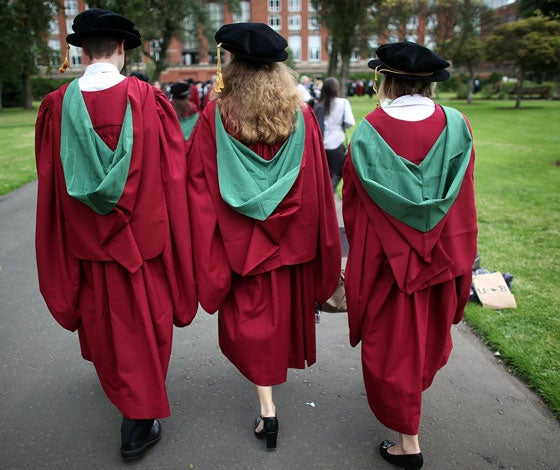
Your support helps us to tell the story
From reproductive rights to climate change to Big Tech, The Independent is on the ground when the story is developing. Whether it's investigating the financials of Elon Musk's pro-Trump PAC or producing our latest documentary, 'The A Word', which shines a light on the American women fighting for reproductive rights, we know how important it is to parse out the facts from the messaging.
At such a critical moment in US history, we need reporters on the ground. Your donation allows us to keep sending journalists to speak to both sides of the story.
The Independent is trusted by Americans across the entire political spectrum. And unlike many other quality news outlets, we choose not to lock Americans out of our reporting and analysis with paywalls. We believe quality journalism should be available to everyone, paid for by those who can afford it.
Your support makes all the difference.What courses? Education (often specialising in either primary or secondary); education studies; childhood, youth and education studies; early years education; professional education.
What do you come out with? BA or BEd if you're training to be a teacher straight from school; a PGCE (Postgraduate Certificate in Education), if you're coming from university.
Why do it? "If you think making a difference in people’s lives is important, then becoming an educator is for you. Whether you are teaching children, young people or adults, you can witness directly the impact you have on them as they learn to develop their knowledge, skills and values. Education is a proven engine of social mobility, of enabling people to expand their horizons and to achieve things they might not have thought possible. If you have the dedication to make a difference, degrees in education are for you." - Professor Richard Edwards, head of School of Education, University of Stirling
What’s it all about? Learning about learning. “But I know about learning, I’ve spent long enough doing it!” I hear you say. Well, you’ll never have thought about it in this much depth before - expect to study the history of education, the psychology behind learning and the philosophy of what actually makes up an education. Some courses, like Roehampton’s, concentrate on psychology and philosophy first and foremost, looking at theories of social justice, citizenship, the sociology of education and students’ own reflections on their own experiences of education. Others are based more on the history of education in Britain, and the government policy that dictates what is taught in schools. While the first year of most degrees is spent looking at core background issues in education, students are usually able to specialise from the second year onward, learning about a particular area of education that interests them most, such as special needs learning, learning in a digital world and adult learning. Although education degrees provide a largely theoretical foundation to a career in teaching, with most requiring a dissertation in the final year, work placements in schools are encouraged, and compulsory at many institutions. PGCEs are more vocational and aimed at teaching you how to teach, as opposed to learning about learning, and can only be studied once you’ve completed a degree.
Study options: Three years full-time for BAs and BEds (four years in Scotland), or one year full-time for a PGCE Cambridge, which comes out tops for education, only offers its course as a joint honours degree, where you study another subject in depth alongside your study of education. Brighton’s course is four years long, and you come out with Qualified Teacher Status (QTS).
What will I need to do it? Anything goes usually, although if studying alongside another subject for joint honours, you’re likely to need an A-level in that subject. Edinburgh requires you to have English or maths at A-level at Grade B. Most places ask for GCSE passes in English, maths and science. Grade requirements vary depending on institution, but at Cambridge you’ll need A*AA, at Stirling it’s CCD, and to study at East Anglia you’ll need BBB.
What are my job prospects? Good. There is still a massive demand for teachers, and this shows in employment figures for education graduates. The Times’ Good University Guide 2012, placed education at ninth out of 62 subject areas graded for employment prospects, with over 60 per cent of graduates entering graduate-level employment within six months of graduating, and only four per cent unemployed. Average graduate salaries are healthy too, at almost £21,000. Although most students go on to teach straight away or complete a PGCE, education graduates also go into a myriad of positions in fields relating to education, including policy-making, journalism, community and social work, and work in museums. Their understanding of one of the most important public services and the social issues that surround it, also means they are able to work in less obviously linked areas, such as international organizations, charities and the media.
Where’s best to do it? Cambridge tops the Complete University Guide 2012, followed by Edinburgh and Stirling (where you study professional education alongside another subject). Education is the only university-level subject still inspected by Ofsted, with Warwick scoring highest for teacher training, followed by UCL and Cambridge.
Related degrees: History; social work; psychology; sociology.
Join our commenting forum
Join thought-provoking conversations, follow other Independent readers and see their replies
Comments